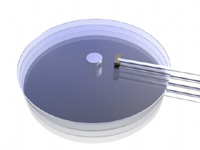 DiskPerf for HP-UX DiskPerf for HP-UX
What is DiskPerf?
DiskPerf performs performance characterizations of your HP 9000's I/O
system and attached disk drives and related storage subsystems.
It tells you how fast your disks are, how fast your system can transfer data
from them, and just how well those fancy disk arrays are actually performing.
With DiskPerf, you can finally get visibility into the physical I/O
capabilities of your system's hardware and capabilities. Your storage
vendors tell you that their disk system is fast, but how do you
really know? Before DiskPerf, you had to rely on application level
performance measurements and overall system performance tools which don't
tell you much (if anything) about what your hardware is really doing
because they measure performance of the system as a whole, rather than
the I/O subsystem specifically.
DiskPerf can help pinpoint problem (slow) disk drives. In the example
below, we see that DISK 3 (with /home) is slower than DISK 1 (which
has /, /var, /usr, /tmp, and /opt). Thus, DISK 3 is a good
candidate for replacing.
All of DiskPerf's operations are non-destructuve and the program can be run
with users on the system.
Some of the measurements that DiskPerf can perform include:
- Serial Access
- Random Access
- Worst-case Access
DiskPerf can test a single drive at a time (allowing you to determine
the maximum performance possible with the drive, channel, and CPU),
or multiple drives at a time (allowing you to determine maximum
system throughput with the drives, channels and CPU(s)).
DiskPerf has an online help facility, and a history stack.
DiskPerf is also available for the MPE/iX Operating System,
here.
Downloads
Example
Oz(su) /: /opt/allegro/bin/diskperf
DiskPerf [20001108] Copyright (c) 2000 Allegro Consultants, Inc.
# disks: 2; # filesystems: 6
Found 2 Volume Groups
DiskPerf: dstat
DISK Hardware Path MBs Device name FileSystem(s)
----: ------------------ : ------- ------------ -------------
1: 10/0.0.0 : 4,095 c0t0d0 / /var /usr /tmp /opt
3: 10/4/4.3.0 : 8,683 c3t3d0 /home
Mounted Filesystems:
/ : hfs : /dev/vg00/lvol1
/var : hfs : /dev/vg00/lvol8
/usr : hfs : /dev/vg00/lvol7
/tmp : hfs : /dev/vg00/lvol6
/opt : hfs : /dev/vg00/lvol5
/home : hfs : /dev/vg01/lvol1
DiskPerf: test all
Test will take about 2.0 minutes...
------------------------------------------------------------------------
Opened disk /dev/rdsk/c0t0d0 (DISK 1)
cRandom of DISK 1; 1 page(s) per read; start at 1 : 70.5 rd/sec
Same of DISK 1; 1 page(s) per read; start at 1 : 911.8 rd/sec
Serial of DISK 1; 1 page(s) per read; start at 1 : 1153.1 rd/sec
Serial100 of DISK 1; 1 page(s) per read; start at 1 : 1165.3 rd/sec
Steady1MB of DISK 1; 1 page(s) per read; start at 1 : 141.3 rd/sec
cWorst of DISK 1; 1 page(s) per read; start at 1 : 42.6 rd/sec
------------------------------------------------------------------------
Opened disk /dev/rdsk/c3t3d0 (DISK 3)
cRandom of DISK 3; 1 page(s) per read; start at 1 : 75.8 rd/sec
Same of DISK 3; 1 page(s) per read; start at 1 : 682.5 rd/sec
Serial of DISK 3; 1 page(s) per read; start at 1 : 686.9 rd/sec
Serial100 of DISK 3; 1 page(s) per read; start at 1 : 689.0 rd/sec
Steady1MB of DISK 3; 1 page(s) per read; start at 1 : 160.5 rd/sec
cWorst of DISK 3; 1 page(s) per read; start at 1 : 61.0 rd/sec
------------------------------------------------------------------------
| Random | Serial |
DISK | Best Average | Best Average | Device name
---- | -------- -------- | -------- -------- | ----------------
1 | 72.5 70.5 | 1185.8 1153.1 | /dev/rdsk/c0t0d0
3 | 76.2 75.8 | 695.8 686.9 | /dev/rdsk/c3t3d0
...
DiskPerf: serial 3 maxsec 20
(will test each for 20 seconds)
------------------------------------------------------------------------
Serial of DISK 3; 1 page(s) per read; start at 1
(DISK 3 = /dev/rdsk/c3t3d0)
DISK 3: 686.3 Serial reads/sec [3501; 3,500]
DISK 3: 691.7 Serial reads/sec [7001; 7,000]
DISK 3: 695.8 Serial reads/sec [10501; 10,500]
DISK 3: 657.4 Serial reads/sec [13801; 13,800]
(stopped by maxsecs; total reads 13,800)
Total read rate:
DISK 3: 682.8 Serial reads/sec [ ; 13,800]
DiskPerf: quit
For more info, or a free demo, email us at:
info@allegro.com
|